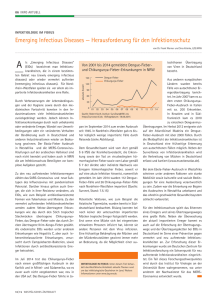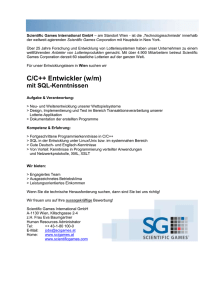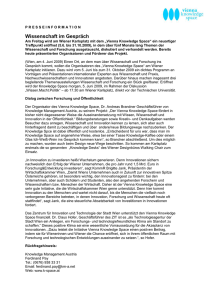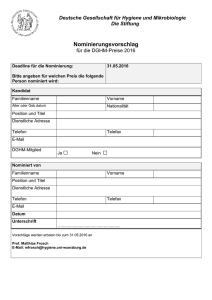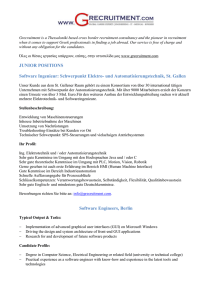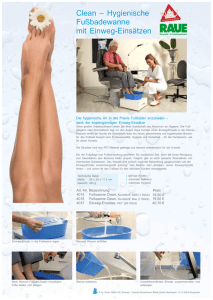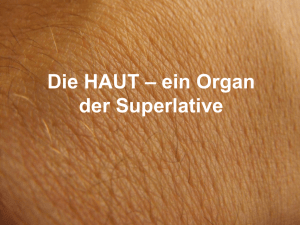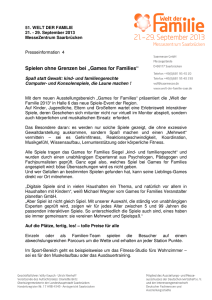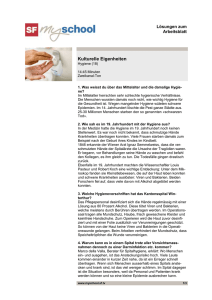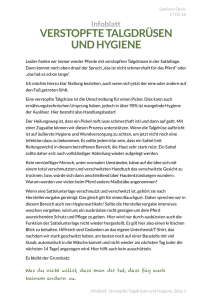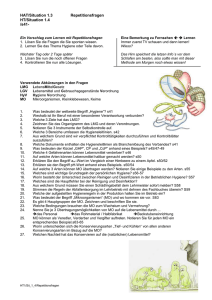Games in the education of medical students
Werbung
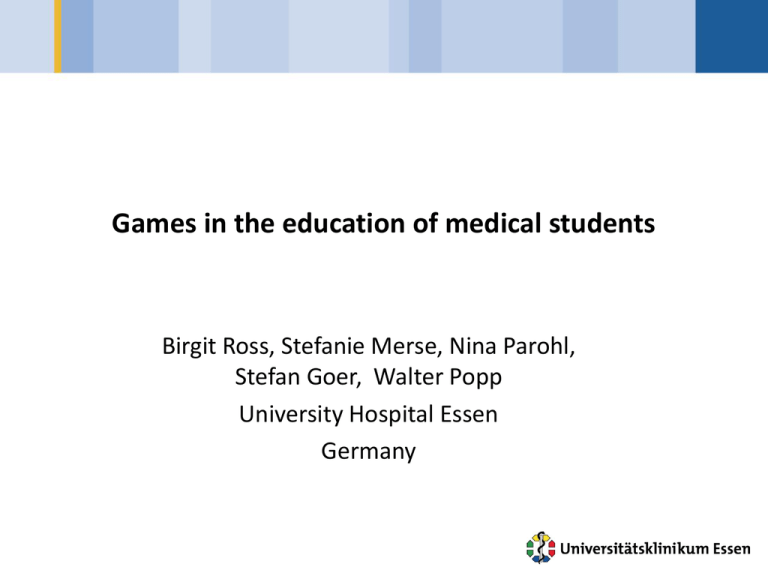
Games in the education of medical students Birgit Ross, Stefanie Merse, Nina Parohl, Stefan Goer, Walter Popp University Hospital Essen Germany Education in Hospital Hygiene -2013 Laboratory Work Students course: Hospital Hygiene (1) Hospital Hygiene(2) microbiological analysis of water samples microbiological analysis of environmental samples Educational Objectives in Hospital Hygiene Acquisition of knowledge, experience and skills in Detection and analysis of nosocomial infections Developing strategies for the prevention of nosocomial infections Infection prevention, recognition and response Monitoring of cleaning, disinfection, sterilization, supply and disposal Analysis of epidemiological surveys Hygiene and infection prevention in medical and public institutions Site inspections and risk analysis in reference to viewpoints of hygiene Participation in the planning, construction and refurbishment of hospitals and other health care facilities The prevention and epidemiology of infectious and non-infectious diseases, including individual and overall disease protection The idea: Learning something about hospital hygiene in a „real life approach“ New concepts: „Serious games“ A serious game is a game in which education (in its various forms) is the primary goal, rather than entertainment* Serious games have more than just story, art, and software, however. (…) They involve pedagogy: activities that educate or instruct, thereby imparting knowledge or skill. This addition makes games serious. ** *Michael D, Chen S. Serious games: Games that educate, train and inform. Mason, OH: Course Technology; 2006. **Zyda M. From Visual Simulation to Virtual Reality to Games. IEEE Computer. 2005; 38(9): 25-32. DOI: 10.1109/MC.2005.297 First Attempt…. First Attempt….seemed to be too difficult…… Diarrhea Vomiting Norovirus confirmed the tasks of the students (1) You are arriving on your ward Monday morning; The team management of your ward reports several lab confirmed Norovirus infections known since yesterday. Some other patients are suffering from diarrhea and/or vomiting. What should you do??? Roles: Senior House Officer, Junior House Officer, Staff Nurse, Medical Student the tasks of the students (2) 1. Find out what you have to do regarding the laws! 2. Clarify what protective clothing is required! Prepare a short training for your collegues about putting on and removing PPE! 3. Which disinfectant do you need? And why? 4. What measures for patients are needed? (use your plan) 5. Please give a short presentation to your collegues how they should deal with the patients. Educational Objectives in the game 1. Knowledge about the infection with noroviruses (transmission, incubation period, clinical signs) 2. Knowledge about hygienic Characteristics of Norovirus infections (low infectious dose, non-enveloped virus, viral persistence, aerosolic transmission possible) 3. Knowledge about reliable sources of information 4. Understanding principles of Cohort Isolation 5. Knowledge about the reporting system for infectious diseases in Germany 6. Outbreak management practice 7. Donning and doffing of protective cloth Material (1) German Infectious Diseases Protection Act Infectious Diseases Registration Form Outbreak Management Documents Different types of disinfectants Personal protective clothes Material (2) Results Different Solutions possible Die wichtigsten empfohlenen Maßnahmen sind: •Isolierung betroffener Patienten in einem Zimmer mit eigenem WC; ggf. Kohortenisolierung; •Unterweisung der Patienten und des Personals hinsichtlich korrekter Händehygiene, Händedesinfektion mit einem viruzid wirksamen Händedesinfektionsmittel (s. auch Punkt 2) und Pflege der Patienten mit Einweghandschuhen, Schutzkittel und ggf. geeignetem Atemschutz zur Vermeidung einer Infektion im Zusammenhang mit Erbrechen; •Durchführung einer sorgfältigen Händehygiene, Händedesinfektion mit einem viruzid wirksamen Händedesinfektionsmittel nach Ablegen der Einweghandschuhe und vor Verlassen des Isolationszimmers; •tägliche (in Sanitärbereichen ggf. häufigere) Wischdesinfektion aller patientennahen Kontaktflächen inkl. Türgriffen mit einem Flächendesinfektionsmittel mit nachgewiesener viruzider Wirksamkeit (als Wirkstoffe sollten Perverbindungen oder Aldehyde bevorzugt werden); •kontaminierte Flächen (z.B. mit Stuhl oder Erbrochenem) sofort nach Anlegen eines Atemschutzes gezielt desinfizierend reinigen; •Pflegeutensilien personenbezogen verwenden und desinfizieren; •Bett- und Leibwäsche als infektiöse Wäsche in einem geschlossenen Wäschesack transportieren und in einem (chemo-thermischen) Waschverfahren ≥ 60°C zu reinigen; •Geschirr kann in der Regel wie üblich maschinell gereinigt werden; •Kontaktpersonen (z.B. Besucher, Familie) sind auf die mögliche Mensch-zu-Mensch-Übertragung durch Kontakt oder virushaltige Tröpfchen beim Erbrechen hinzuweisen und in der korrekten Händedesinfektion zu unterweisen; •Minimierung der Patienten-, Bewohner- und Personalbewegung zwischen den Bereichen/Stationen, um die Ausbreitung innerhalb der Einrichtung nach Möglichkeit zu verhindern (Hinweis auf die Infektionsgefahr bei notwendiger Verlegung eines Erkrankten auf eine andere Station); •strenge Indikationsstellung bei akut Erkrankten hinsichtlich der Verlegungen innerhalb von stationären Bereichen, Altenheimen oder Gemeinschaftseinrichtungen. Die aufnehmende Institution ist vorab zu informieren. •Stationen oder Bereiche, die aufgrund eines Norovirus-Ausbruches für Neuaufnahmen von Patienten gesperrt waren, sollten unter Berücksichtigung der Inkubationszeit nach Auftreten des letzten Krankheitsfalles erst nach erfolgter Schlussdesinfektion wieder geöffnet werden. Educational Objectives in the game 1. Knowledge about the infection with noroviruses (transmission, incubation period, clinical signs) √ 2. Knowledge about hygienic Characteristics of Norovirus infections (low infectious dose, non-enveloped virus, viral persistence, aerosolic transmission possible) √ 3. Knowledge about reliable sources of information √ 4. Understanding principles of Cohort Isolation √ 5. Knowledge about the reporting system for infectious diseases in Germany √ 6. Outbreak management practice √ 7. Donning and doffing of protective cloth Knowledge about PPE was poor – So every student got a paper with the most important informations about wearing PPE And now: Good luck with your first Outbreak Management!
